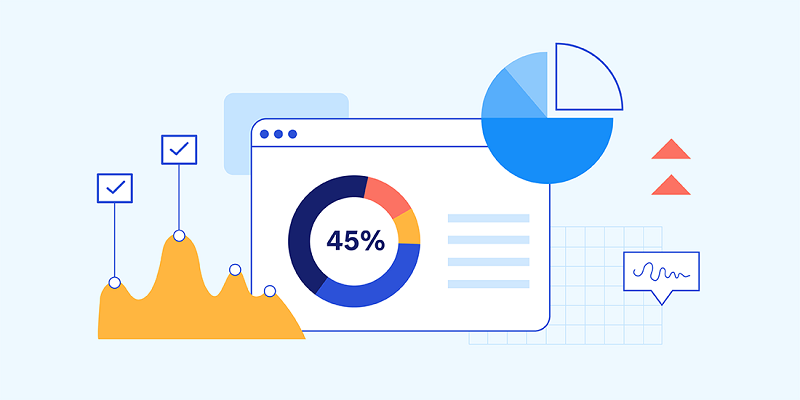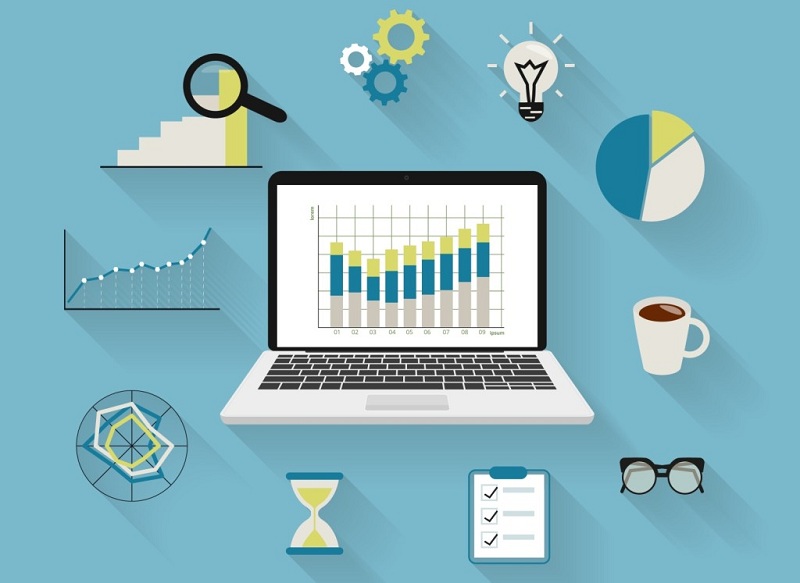Social media analytics for small businesses can be a game-changer. Imagine you found a map that leads to hidden treasure. That’s what digging into your social data is like. It’s not just numbers; it’s the clues to your success. As a small business, you can’t afford to miss the secrets these metrics reveal. You need to know what works, what doesn’t, and how to spend your precious time and money wisely. With the right tools and know-how, you can steer your strategy towards real growth. This post is your shovel and I’m here to help you dig deep, uncover the hidden gems, and polish your online presence to a shine. Let’s dive into the metrics that matter, optimize like pros, and outsmart the competition. Ready to transform your business with insights as powerful as a viral tweet? Let’s go!
Decoding Social Media Metrics for Smarter Business Decisions
Understanding Key Performance Indicators (KPIs)
Small businesses must watch the right signs to win the social media game. Think of Key Performance Indicators (KPIs) as a compass in your social media journey. They point you where to go. They help steer your online chats and content. Big words, right? Let’s keep it simple.
Engagement is a top KPI. It counts likes, shares, and comments. More engagement means more people like what you do. Track follower growth rate too. More followers can mean a wider reach. But, don’t just seek numbers. Seek fans who love what you share.
Watch for brand mentions. These are times your brand pops up online. They can tell you what people think about your brand. Use this info to keep your friends and win over the unsure.
Understanding social media traffic is like understanding roads in a new city. Some paths are super busy; others, not so much. Knowing where your visitors come from helps you to meet them there.
Now, let’s talk ROI, or Return on Investment. How do you know if the time and money you spend pay off? Simple. Measure the actions that matter most. Like sales from social media links or sign-ups for your newsletters. Judge social media like any business move. Ask: Are we winning?
Tools for Tracking and Analyzing Data
Alright, how do we catch all these numbers? There are tools for that! Tools for social media tracking pull data like a magnet pulls nails. They’re perfect for small businesses with big dreams but small teams.
Social media report generation tools boil down what’s happening into reports. Just what you need, nothing more. This makes checking progress as easy as pie. And, with social media benchmarking for startups, you’ll see how you stack up against others.
And guess what? Hashtag performance tracking lets you know which hashtags work. Are they just a pretty bunch of words, or do they bring friends to the yard? Use tools to find out.
For the feelings behind the clicks and likes, dive into analyzing customer sentiment. Are people happy with what you do? Or not? This can tell you lots without asking directly.
From LinkedIn analytics to Instagram stats, each platform offers its own tools. Get to know them. They’re the keys to unlock serious growth.
Small biz folks, I get you. It’s scary to jump into a sea of social media data. But, fear not! With the right KPIs and tools, you’ll swim, not sink. Grab these gems, use them, and watch your business grow. It’s not just about big data – it’s about the right data. And now, you know how to find it.

Enhancing Engagement and Brand Presence Online
Strategies to Optimize Social Profiles
To grow your small business, your social media must shine. It’s like dressing up a shop window; you want to lure folks in! First, make sure your profiles are clean and engaging. Use logos and images that catch the eye. Fill your bio with punchy, clear info. Make it super easy for customers to know what you do.
Next, link to your website. It’s a simple move but a powerhouse for driving traffic. Have a clear call to action too. Tell your visitors exactly what you want them to do. Shop? Sign up? You decide, then make it pop.
Analyzing and Utilizing Engagement Metrics
Understanding your online audience is like having a road map to treasure. To track engagement online, focus on likes, comments, and shares. The more you have, the better you’re connecting. You want a buzzing community, right?
Now, let’s unpack brand mentions. When folks talk about your brand, you’re doing it right. Track every shout-out. Say thanks when you can. It builds rapport and keeps your brand in the buzz.
Small business ROI from social can look like more sales or a bigger fan base. Every post should aim to hook your readers. Did they buy? Did they follow? Check those numbers to find out.
Track follower growth rate too. It’s like watching your garden bloom. Are you gaining new followers? Good. If not, it’s time to spice up your posts.
Tools for social media tracking can make this easier. There are plenty out there, even free ones, that help you keep an eye on these numbers.
Don’t forget metrics like reach vs. impressions. Reach is how many folks see your posts. Impressions are the total times your post is seen. Understand this, and you understand how far your voice travels.
Conversion rate on social platforms is also key. It tells you how many folks go from looking to buying. It’s like tracking seeds planted that grow into sales.
Lastly, remember to listen. Social listening tools help you tune into what folks say about your brand. It’s like having ears all over the internet.
In a nutshell, track your social media health like you would your own heartbeat. Stay active, stay engaging, and keep those metrics up. With these tips, your small business can grow big online.

Competitive Advantage through Social Media Insights
Performing Competitor Social Media Analysis
Want to know what the other guys are doing? Look at their social profiles. See what works for them. Track what kind of posts get the most likes and shares. Check out the hashtags they use. Are they talking to their customers? How fast? Learn from this. What they do right, you can try too. What they get wrong might be a chance for you. It’s like a free peek into their playbook.
Businesses like yours can use tools to track this stuff. Pick tools that show you data in ways easy to understand. Some even offer reports, so you don’t get lost in numbers. Knowing what’s popular helps you choose better content. It can also show you the best times to post. This means more people might see your stuff.
Measuring Social Impact and ROI for Small Businesses
Have you ever wondered, “Is all this social media stuff paying off?” There’s a way to know. Look at metrics like likes, shares, and comments to track engagement online. But don’t stop there. Find out if people go from your social page to your website. Check your sales numbers before and after big social pushes. Compare costs to results, and that’s your ROI.
Social media metrics for SMEs can show the best topics or promos. They reveal which platforms work best for your brand. And the coolest part? Some of these tools for social media tracking are free or cheap. Good for your wallet, great for your business.
ROI isn’t just about money, either. It’s what you learn about your audience. It’s gaining fans that can turn into customers. It’s building a voice that people trust. Knowing all this can change your game.
Think big but start small. Find out who your audience is and what they like. Pick a few key stats to keep an eye on. From there, you can build out your plans, step by step. Keep asking, “How did this help my business grow?” Keep your goals clear, and the data you track should answer that question for you.
Remember, your efforts online can lead to sales and fans offline. That’s the hidden gem in social media for small businesses. Measure, learn, and then grow. That’s how you win.

Content and Audience Analysis for Growth
Leveraging Audience Insights and Demographics
First things first: know your audience. Who are they? Get data on age, location, and interests. Use tools like Facebook Insights and Instagram performance stats. These tools help you learn who follows you and likes your stuff.
Find out when they’re online. Schedule posts for those times. Use tools for social media tracking to see trends. This means watching how people act over time. Do they like photos or videos best? Learn and use this info.
Next, look back. Which posts got lots of likes or shares? Make more posts like these. Use this to make your plan. A good social media report can show you all this. It’s like a story of what works best.
Assessing Content Performance and Influencer Impact
Now, think about your posts. Are they hitting the mark? Use social media metrics for SMEs to check. Tools like Twitter analytics tell you which tweets get noticed. And Instagram stats show which pics or stories get love.
Do you work with influencers? See if they really help. Are people talking about your brand more with their help? Track engagement online to know. Use hashtag performance tracking to check this.
Check how your posts and influencer collabs do. Do they lead to more site visits or sales? If yes, you’re on the right track. If no, it’s time to switch things up. Use info on best social media KPIs to guide you.
Also, keep an eye on your competitors. What’s working for them? Use competitor social media analysis for clues. Understand social media traffic to get ahead. Are their followers growing faster than yours? Analyze brand mentions to see why.
Remember, each platform has different vibes. What works on Facebook might not on LinkedIn. See where you shine and focus there. Social media benchmarking for startups can show you how you stack up.
Social media isn’t just chatting. It’s a powerful tool for business. Learn from what the data shows you. Then, use it to grow smarter. Every like, share, or comment is a piece of the puzzle. Put them together to see the whole picture.
To sum it up, use your audience data well. It can tell you tons. And keep checking how your content does. This leads to growth that you can really see – more followers, more sales, and a bigger impact.
In this post, we looked at how to make smart business moves using social media stats. We discussed knowing your key numbers and picking good tools to track them. We also covered ways to boost how people engage with your brand and how to make your online profile better. Plus, we talked about keeping an eye on your competitors and understanding the real gain for your effort. Finally, we explored how to know your audience better and see which posts work best. Remember, the goal is to use what you learn to grow and get ahead. Social media can really help your business shine if you use the insights wisely. Keep analyzing, keep learning, and keep growing!
Q&A :
What is social media analytics and why is it important for small businesses?
Social media analytics involves the gathering and analysis of data from social media platforms to help inform decision-making and strategy for businesses. It’s especially important for small businesses as it provides insights into customer behavior, engagement, and preferences. This data helps in fine-tuning marketing strategies, identifying target audiences, and optimizing social media campaigns to improve ROI.
How can small businesses leverage social media analytics to compete with larger businesses?
Small businesses can use social media analytics to gain a competitive advantage by understanding their niche audience more deeply and tailoring their content and marketing efforts more effectively than larger, less agile competitors. By focusing on engagement metrics, customer sentiment, and conversion rates, they can create high-impact strategies suited to their unique business needs.
What are some effective tools for social media analytics that are suitable for small businesses?
For small businesses, cost-effective and user-friendly tools are key. Some effective social media analytics tools include Hootsuite, Buffer Analyze, and Sprout Social. These platforms offer a range of analytical features, such as engagement metrics, follower demographics, and performance reports, enabling small businesses to make informed decisions without a hefty investment.
How often should small businesses conduct social media analytics?
The frequency of conducting social media analytics can vary depending on the size of the business and the volume of social media activity. Generally, small businesses should perform a basic analysis weekly to track engagement and content performance. A more comprehensive analysis should be done monthly to guide strategy adjustments and understand long-term trends.
What metrics should small businesses focus on in social media analytics?
Small businesses should concentrate on metrics that align with their specific goals, such as engagement rates, reach, impressions, and conversion rates. Additionally, analyzing metrics such as follower growth, top-performing content, click-through rates, and customer sentiment can provide valuable insights into brand health and campaign effectiveness.



